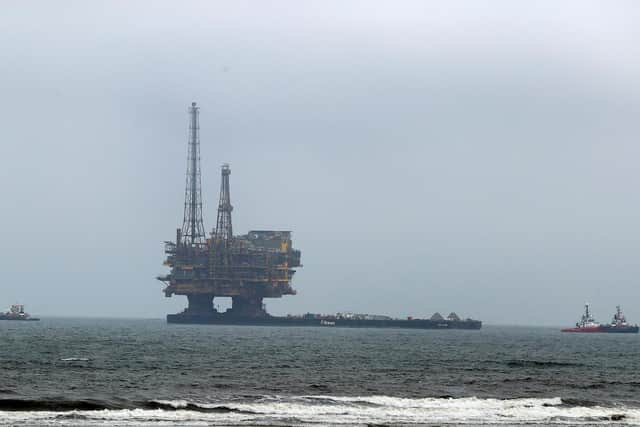Shell under fire for favouring ‘profit over people and planet’ after U-turn on pledge to cut oil and gas
The multinational company, which is headquartered in London, had pledged to reduce the quantities of fossil fuels it produces by up to 2 per cent annually until 2030 to lower greenhouse gas emissions from its operations.
But in a statement to investors at its Capital Markets Day, Shell’s new boss signalled a renewed drive to drill for hydrocarbons, particularly gas, in a bid to reap maximum profits for shareholders.
Advertisement
Hide AdAdvertisement
Hide AdChief executive Wael Sawan said the company would keep the amount of oil it extracts from wells around the world at the same level as today, saying its 2030 reduction target had already been met – with production falling from 1.9 million barrels of oil equivalent a day in 2019 to 1.5 million in 2022.
In a statement, Shell said: “Our target of a reduction in oil production by 2030 has not changed. We’ve just met it eight years early.”
The company took in record annual profits of £33.1 billion in 2022, and this year has already reported first-quarter profits of £7.6bn – its highest ever for the period.
Reductions in production have been achieved through selling off oil fields to other companies, which continue to drill the sites. However, campaigners have condemned the “bombshell” decision, calling for Shell to reconsider the move, which they say could generate extra climate pollution of the same magnitude as a small country.


“Fossil fuel greed is putting all of us at risk,” said Charlie Kronick, senior climate advisor at Greenpeace UK.
“Shell’s production cut was always a joke, allowing oil production to fall more slowly than natural decline while boosting gas production at the same time – now they're showing their true colours.
“From wildfires in Canada to drought and flooding in East Africa, the effects of climate change are already devastating lives and livelihoods around the world.
“Yet Shell and their competitors remain determined to squeeze every last drop of profit from their dirty oil and gas operations. The writing is on the wall for oil and gas, but Wael Sawan is refusing to read it.”
Advertisement
Hide AdAdvertisement
Hide AdHe added: “We urgently need concerted global action to force the industry to stop drilling, and start paying for the damage they cause to our planet and the people who live on it.”
International campaign group Global Witness has estimated – using data from energy analysts Rystad – that Shell’s latest plans could produce an average 29 million tonnes of extra carbon dioxide annually, around the same as the total yearly emissions from Denmark.
The announcement by Shell, which operates the St Fergus and Mossmorran gas plants in Scotland, as well as oil and gas fields in the North Sea, comes after the company and other petroleum majors such as BP and Exxon reaped record profits in 2022. These profits were largely due to volatility in international markets, driven by the war in Ukraine and a post-pandemic rise in demand.
It also follows a damning new report from the Intergovernmental Panel on Climate Change (IPCC), which warned there is a more than 50 per cent chance that global temperature rise will reach or surpass the 1.5C ‘danger level’ before 2040.
Record profits, pocketed as a result of the energy crisis, should be used to boost green investment, according to Jonathan Noronha-Gant, senior campaigner with Global Witness, not “shareholder pay-outs and a doubling down on climate-wrecking fossil fuels”.
He said: “It will always be profit over people and planet for polluters. This U-turn from Shell is a climate bombshell and exposes the hollowness behind the setting of such a target.
“Shell simply cannot be trusted – with either their own meagre targets or our futures.”
Helen Clarkson, chief executive of Climate Group, added: “This is not just a run-of-the-mill business decision, but Shell recklessly abandoning its responsibilities for the climate crisis. It has now lost its claim to any form of climate credibility and is moving into pariah status.”
Advertisement
Hide AdAdvertisement
Hide AdScottish Greens MSP and energy spokesperson Mark Ruskell said Shell’s move exposes the “breath-taking complacency at the heart of the oil and gas industry”, and underlines the need for “tough and robust legislation” to regulate operations.
He said: “With soaring temperatures, wildfires and weather warnings, we can all see the devastating impact of climate chaos around us. Our planet can't afford any more of it.
“Yet, despite the devastating impact they are having, these companies are being boosted and supported by governments like in Downing Street, who are looking to licence even more drilling.
“One of the most vital things that we must do is sharply reduce our dependence on oil and gas rather than keeping it at climate-wrecking levels.
“We need an urgent and effective just transition away from fossil fuels and an end to new oil and gas licences. Anything less than that would have a devastating impact on future generations.”
Meanwhile, the Scottish Conservatives stressed the need for home-grown supplies of fuel and to safeguard energy-sector jobs.
Liam Kerr, shadow secretary for net zero, energy and transport, said: “If Shell has met stringent emissions targets around seven years early, that has to be good news while demand remains so high for fossil fuels.
“The investment and skills of North Sea companies are crucial to a just transition away from oil and gas, while the positive decarbonisation steps going on around production from the North Sea already ensure domestic emissions are around three times lower than supplies imported from places like Qatar.
Advertisement
Hide AdAdvertisement
Hide Ad“A healthy domestic industry, decarbonising in exploration and production in this way, protects jobs across the UK and reduces our exposure to less well-regulated and more unstable regimes such as Russia.”
Comments
Want to join the conversation? Please or to comment on this article.